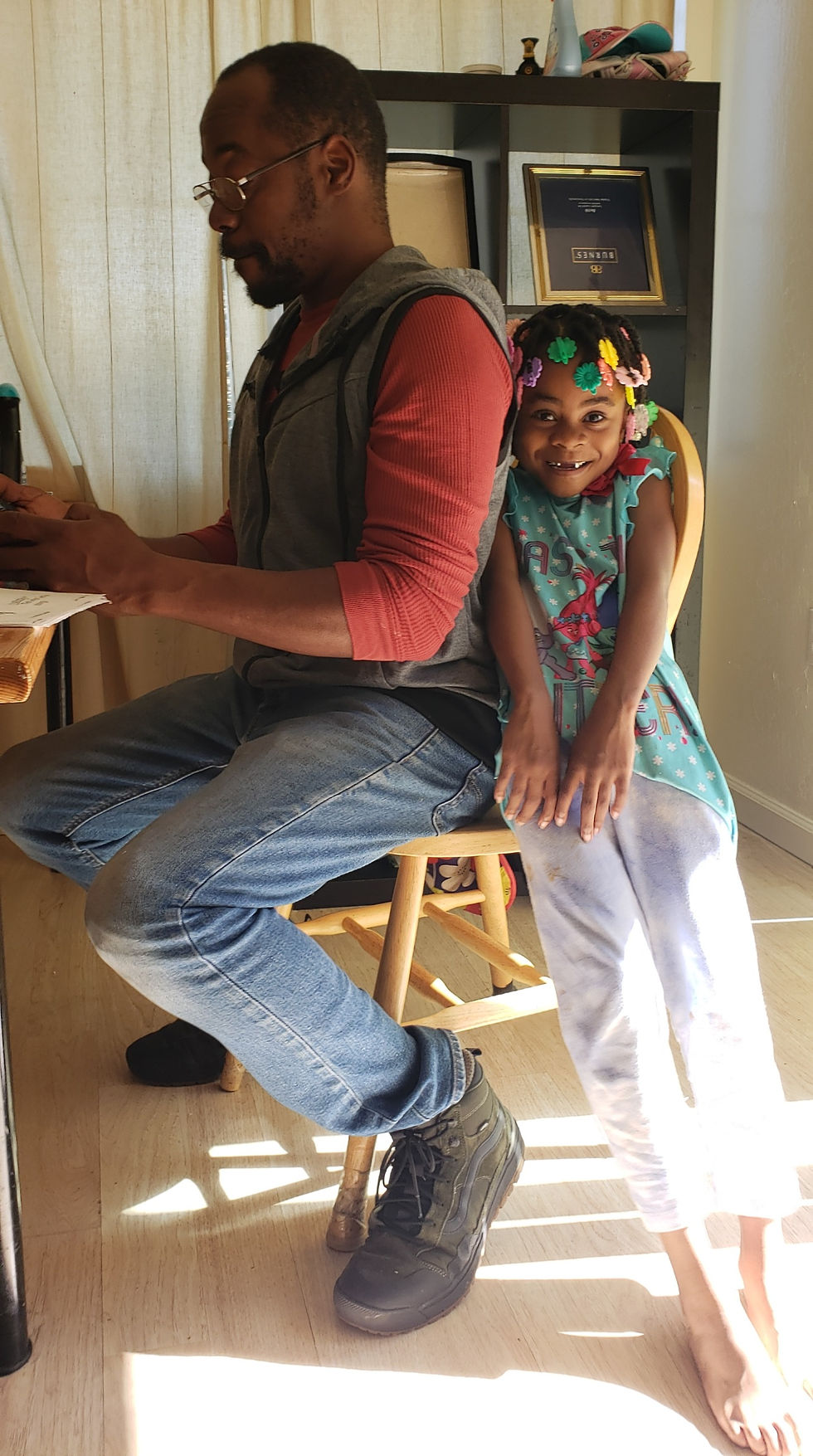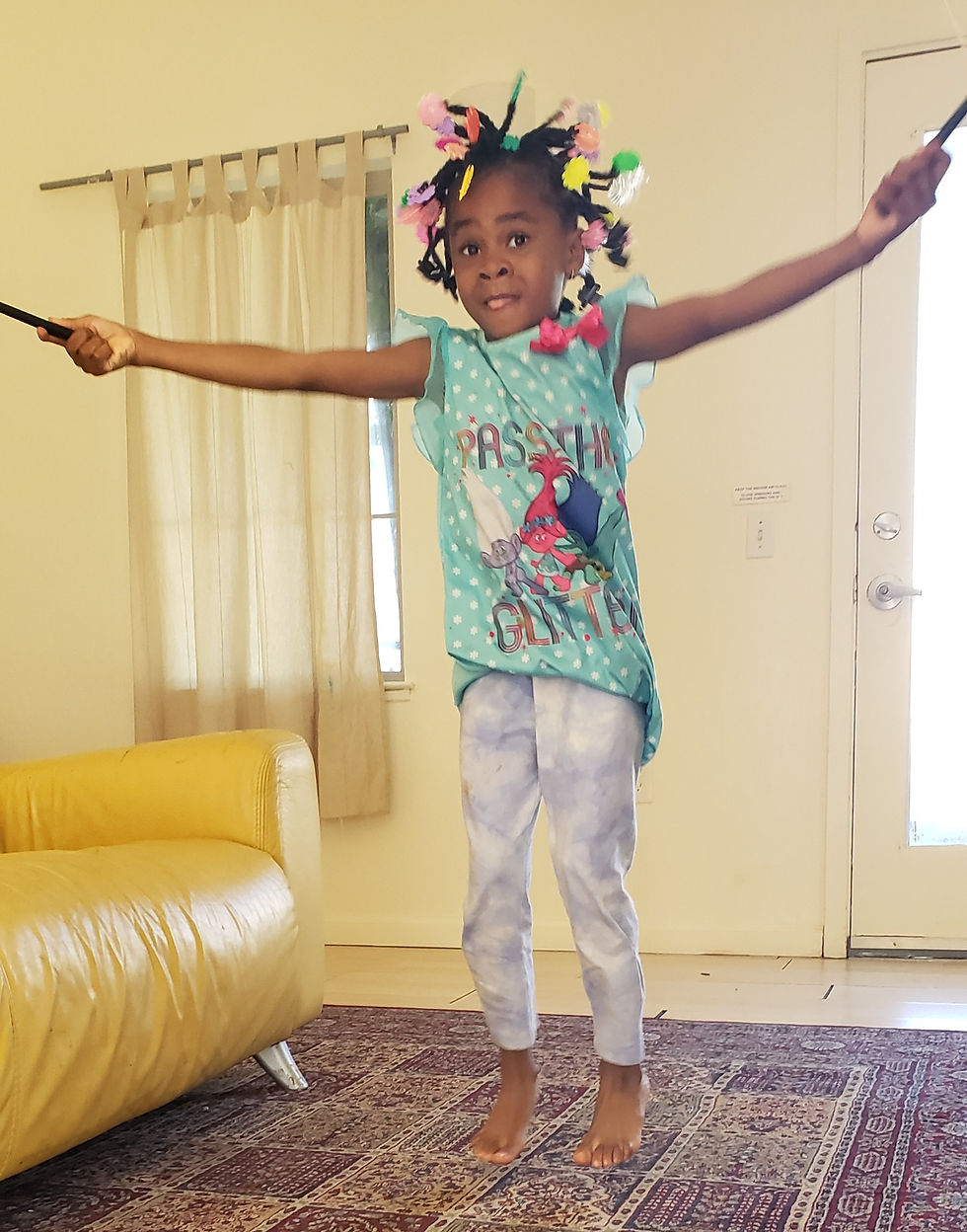Distance Learning While Homeless
- Mar 15, 2021
- 3 min read

At about 10 am on a recent Wednesday, Jon-Mychal, the Teacher in the BOSS Children’s Learning Center (CLC) set up a table outside in the courtyard at Ursula Sherman Village (USV).
USV is BOSS’s emergency shelter program in West Berkeley for families and individuals who are looking for permanent housing – the CLC helps the kids who live there with academic and developmental needs. For over 20 years, the CLC has operated behind the shelter in a trailer donated by the Alameda County Office of Education – since the pandemic began, the trailer has been closed and the Teacher assists the children outside, online, or by phone.
Jon-Mychal put paper and pens on the table for kids to color with, informational flyers for parents, a box of gift bags with toiletries and socks for families to take (donated by United Way of the Bay Area), and a big box of donuts. Families had been informed all week about the opportunity to share their thoughts on distance learning.
The first person to approach was a little boy who got curious about the table with goodies on it, and came over to ask for a donut. I asked him what grade he was in, and he said first grade. His mom came out onto the deck of the family shelter and said he’s enrolled in San Ramon (where they have family) and the school had just notified them that they were re-opening in person learning. She shook her head.
“We’re not ready to send him back,” she said. It seemed too quick, she added. They were notified of it out of the blue yesterday.
She nodded to her son that it was OK to collect a donut and gift bag, so he came and chose a chocolate frosted donut and took packets of shampoo, toothpaste, and socks then went back to his mom.
Another parent came out, and sat on the circular planter outside Sankofa House, the most recent addition at USV where 10 families have private living space and shared kitchens and dining areas. He said he has an 11 year old and a 17 year old – and it’s been challenging because he works during the day, so they go to their friends’ house and join zoom classes from there.
“You just have to trust that they’re doing what they’re supposed to,” he said.
A third parent came out and took a seat on the planter, as well. With a 6 year old and an 8 year old, he said, distance learning is very difficult.

“First, they don’t want to get out of bed,” he said. And they get restless while on the computer.
“They miss their teacher, they miss their friends, they miss recess,” he said.
Both parents described recurring difficulties with connectivity – signal dropping out, etc. They do have chromebooks received from the school, so equipment hasn’t been a problem.
Another parent, with a 13 year old, said they get bored easily starting at screens.
“They’re not required to have the camera on, so the kids stop paying attention,” he said.
Distance learning has not been all negative, many agreed. Parents did like the shorter days, giving them more time for homework, play and downtime, and family time.
“And no bullying or fighting,” one mom said. But added that distance learning is hardest on kids in abusive homes.
One parent described being in their car for a time, and using the laptop when parked by an available signal, but with the camera on, the other kids could see that they were in a car.
Teenagers especially, she said, want to get out and away from their parents – being cooped up together with your parents is not conductive to learning.
A dad with a 15 year old daughter agreed, describing how easy it is for them to tune the teacher out.

“There are too many distractions at home,” he said.
All parents felt there is more pressure on them, to make sure the kids participate and monitor their engagement. This is particularly hard to do when your days are spent working, looking for work, or trying to find permanent housing. All agreed that the sooner the kids return to the classroom, the better….As long as it’s safe.
Donate HERE to support the Children’s Learning Center (CLC)!
Contact Jon-Mychal Cox to learn about volunteer opportunities, jmcox@self-sufficiency.org.







![[Press] West Oakland homeless shelters will close in June - not March](https://static.wixstatic.com/media/519b73_10990d67946d4f42b046703c253b74c0~mv2.png/v1/fill/w_980,h_588,al_c,q_90,usm_0.66_1.00_0.01,enc_avif,quality_auto/519b73_10990d67946d4f42b046703c253b74c0~mv2.png)
![[Press] Oakland to close two major homeless shelters](https://static.wixstatic.com/media/519b73_bb688d6166324c5fb125c3218c1dd126~mv2.png/v1/fill/w_400,h_154,al_c,q_85,enc_avif,quality_auto/519b73_bb688d6166324c5fb125c3218c1dd126~mv2.png)
Comments